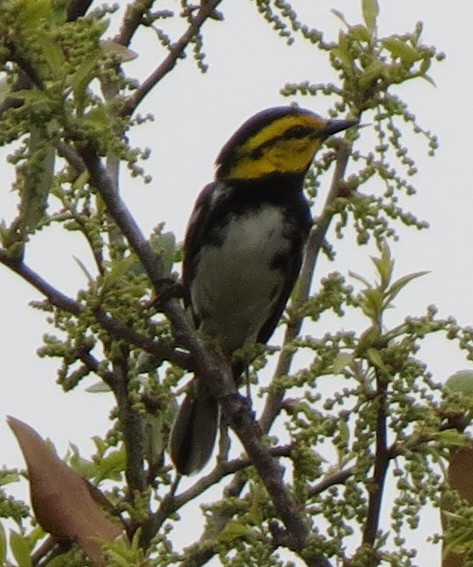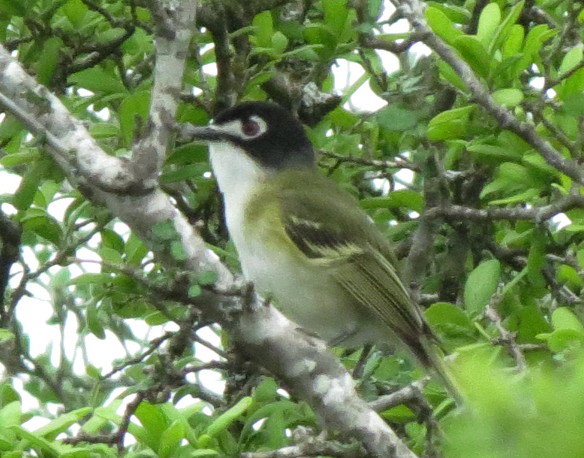© 2006-2018 - All Rights Reserved
Truly there are only 2 species for which the hill country is considered the only/best place to see them easily in numbers. The Golden-cheeked Warbler (which has its own photo page) and the Black-capped Vireo. Here is a pic of each first. Further down I put a picture or two of a juvenile Golden-cheeked Warbler, quite unlike most of the field guide depictions you are used to.

Golden-cheeked Warbler, the Edwards Plateau's most endemic bird species, it breeds nowhere else.

Black-capped Vireo, male, pardon the fuzzy pixels
but my they are arranged very nicely. They can be found
off the Edw. Plateau, but are most common on it.
Otherwise, here are some of the birds that most visitors have on their "want lists." Though for most, the hill country is only a small part of their range, they are not truly specialties in the strict sense. It is a great place to see them because they are generally numerous and widespread. To locals they are regulars, but most visitors can't get enough of them.
Some of these species include Scissor-tailed and Vermilion Flycatchers, Painted Bunting, Zone-tailed Hawk, Cliff and Cave Swallows, Green Kingfisher, Black Phoebe, Golden-fronted Woodpecker, Scrub-Jay, and Canyon Towhee, amongst others.

Scissor-tailed Flycatchers (adult and juvenile) young are yellow underneath with a short tail.

Canyon Towhee, the least predictible bird here besides Bushtit.

texana subspecies of Western (now Woodhouse's - but it's not) Scrub-Jay

Painted Bunting (adult male)

Zone-tailed Hawk

Vermilion Flycatcher

Golden-fronted Woodpecker (female)

Cliff and Cave Swallows gathering mud for nests. Caves are in front on ground, one just left of center and one to the right with buffy, not chestnut throats.

Cave Swallow, center
And the bird I can't get enough of ...

Green Kingfisher





Golden-cheeked Warbler (juvenile)
At first they don't even have a golden cheek this juvenile is about half way there.

Audubon's Oriole, formerly called
Black-headed Oriole - note yellow-green unmarked back
(It's eating peanut butter off branch)

Scott's Oriole - note black back and chest, and won't touch peanut butter.
If you have arrived here from our Bird Photos page, you may close your browser to return to the Bird Photos index.
Other visitors may click your "Back" button on your browser or select a link to keep visiting!

To Bird Photo Main Menu

To Butterfly Pics

To Dragonfly & Damselfly Pics

To Current Bird News
Birds
Utopia Birds
Birding Sites
Bird List
Bird Guide
Reports from Lost Maples
Winter Bird Count
Butterflies
Butterfly News
Butterfly List
Butterfly Photos
Rare Butterflies
Dragonflies
Critters, Bugs, & Stuff
Lost Maples
Garner State Park
Local Site Guide
Home

Our E-mail
mitch @ utopianature.com
 All photographs within this site are copyrighted
All photographs within this site are copyrighted